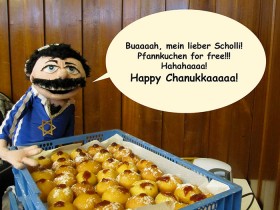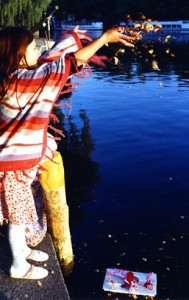
One of the hand puppets from Shlomit Tulgan’s bubales family saying “Oooh, my oh my! Hotcakes for free!!!”
CC-BY Shlomit Tulgan
I was asked recently if I could write something about how I celebrate Hanukkah in my own circle of family and friends. It occurred to me that the last time I spent Hanukkah with friends or with my parents was quite awhile back. I rummaged around through old photos until I found a picture of me with my father in 1988, lighting our Hanukkah candelabrum: we had just applied for political asylum in West Berlin and were allowed to stay with friends, so we didn’t have to remain longer in refugee quarters. For me back then, Hanukkah was a personal, family thing. → continue reading
Purim is a family celebration, a time when children dress up, make a great din with rattles and gorge themselves on traditional Haman sweetmeats. By so much merriment it seems a little astonishing to recall that this religious holiday is actually rooted in a Bible story that is anything but happy and G-rated.

King Ahasuerus falls in love with Esther © photo: Shlomit Tulgan
The Book of Esther, which is read on Purim, tells of how the orphan girl Esther carries out a spectacular operation to rescue the Jewish people from the hands of King Ahasuerus, ruler of the Kingdom of Persia. The anonymous author recounts this story in the style of an epic poem and thereby suggests that God plays only a minor role in the proceedings. He turns the spotlight instead on the cunning with which clever Esther and her Uncle Mordechai manage to stop vizier Haman from realizing the pogrom he has planned against the Persian Jews. → continue reading
 A few years ago, a guest lecturer from New York visited the Berlin synagogue at Fraenkelufer and showed our congregation a new way of practicing an old Rosh ha-Shanah custom, that of tashlikh.
A few years ago, a guest lecturer from New York visited the Berlin synagogue at Fraenkelufer and showed our congregation a new way of practicing an old Rosh ha-Shanah custom, that of tashlikh.
Usually Jews gather for the New Year holiday at the bank of a river and scatter breadcrumbs in the water as a symbolic way of shedding their misdeeds of the last year. The American professor did not strew breadcrumbs in the canal across from the synagogue however; rather, she placed a little homemade paper boat into the water, in which she’d tucked a letter to God. In the letter, she begged for forgiveness for her offences and affirmed her resolutions. The letter also contained thanks for the good experiences of the last year and her wishes for the coming one. → continue reading


